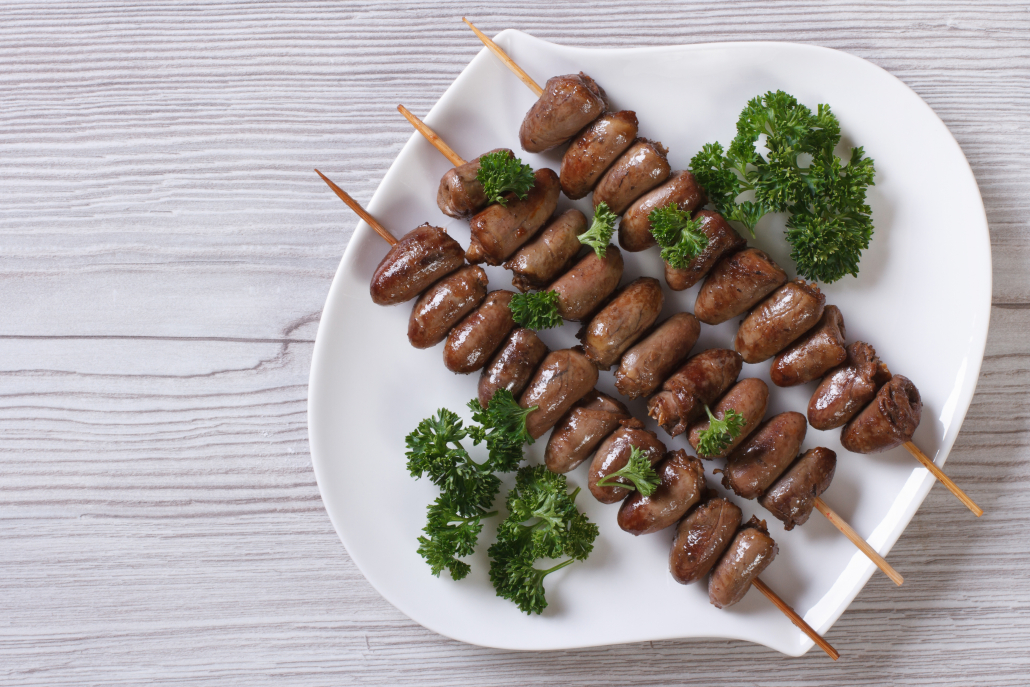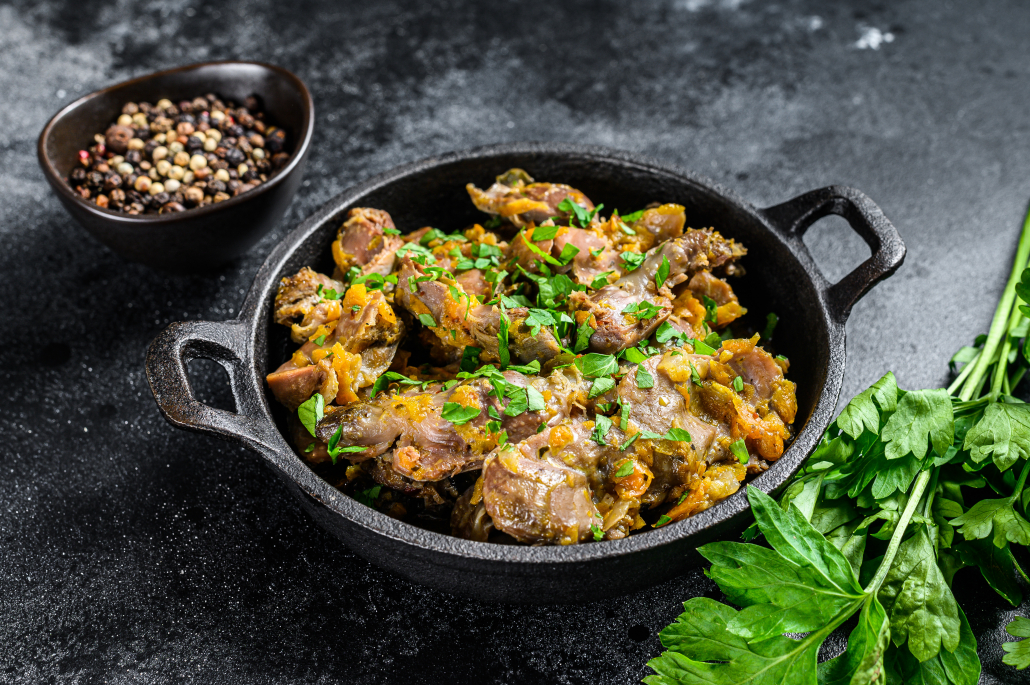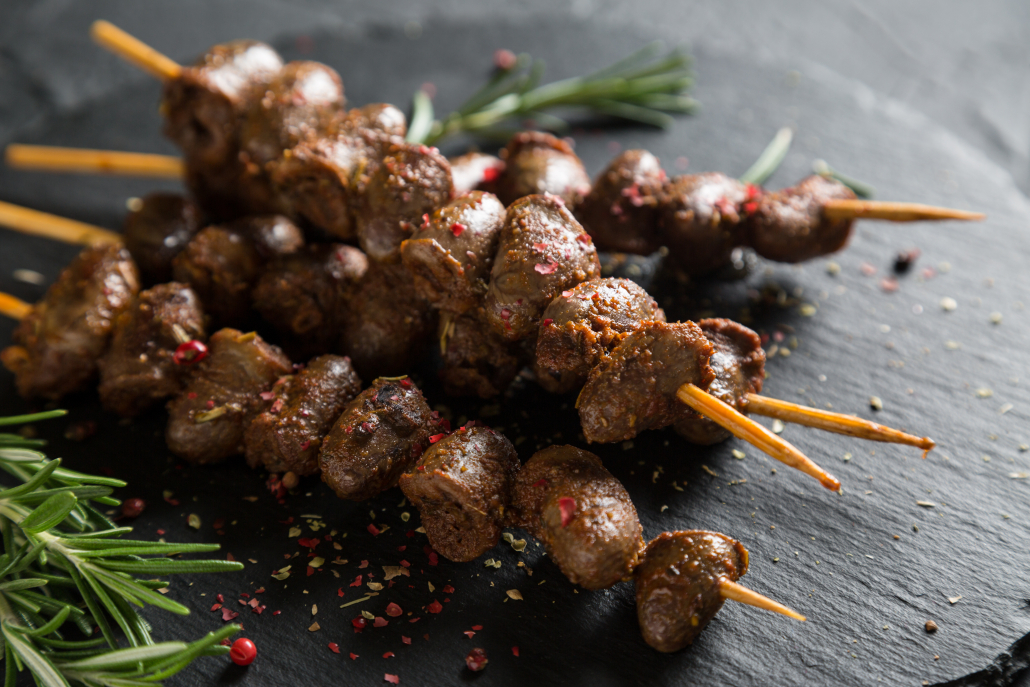We include products in articles we think are useful for our readers. If you buy products or services through links on our website, we may earn a small commission.
Chicken Heart: Benefits, Nutrition, Recipes

Table of Contents
Chicken hearts may not be the first thing that comes to mind when you think of fine dining or dining at all. But when considering their nutrition benefits, they probably should be. Chicken hearts are good for you, and it’s been known in many parts of the world where Chicken heart is a staple. Now it’s finally making a resurgence in the West as part of the nose-to-tail eating movement. [1]
Let’s take a closer look at what makes chicken heart so exceptionally nutritious. We also provide a couple of chicken heart recipes that are as easy as they are delicious.
What is Chicken Heart?
As you might expect, chicken heart is simply the prepared heart of a chicken. Chicken heart is usually enjoyed well-cooked and heavily spiced, though its flavor is pretty inoffensive compared to beef heart or other more pungent organ meats.
Chicken Heart Nutrition
This meat is rich in copper, zinc, protein, iron, and B vitamins. A 3.5-ounce serving contains all of the following: [2]
| NUTRIENT | 100g (3.5 oz.) |
| Calories | 183 cal |
| Fat | 8g |
| Carbohydrates | 0.1g |
| Protein | 26g |
| VITAMINS | |
| B1 (Thiamin) | 8.5% |
| B2 (Riboflavin) | 57% |
| Choline | 25% |
| B5 (Pantothenic acid) | 53% |
| B3 (Niacin) | 18% |
| B6 | 19% |
| B9 (Folate) | 20% |
| B12 | 304% |
| MINERALS | |
| Magnesium | 11% |
| Potassium | 19% |
| Iron | 50% |
| Copper | 56% |
| Phosphorus | 16% |
| Selenium | 15% |
| Zinc | 66% |
Of all the nutrients contained in chicken heart, this organ meat shines the brightest when it comes to B vitamins.
Chicken heart pack in an incredible amount of vitamin B12 per serving: 304% per 3.5 ounces. B12 is an essential micronutrient that promotes energy generation, DBN creation, nervous system function while playing a key role in DNA synthesis, red blood cell formation, and nerve health. [3] It is also unusually high in zinc, an earth mineral that plays important roles in wound healing, immune response, and insulin sensitivity. [4]
Chicken Heart Health Benefits
Are chicken hearts good for you? Based on their nutrient profile they sure are! Below are some of chicken heart’s best nutrient-driven benefits.
Muscle Growth
Well over half of the calories in chicken heart come from protein. This protein makes chicken heart great for maintaining muscle mass. But protein does much more than structure muscles — it gives structure to virtually all parts of your body. [5]
Studies show that eating adequate protein sets the hormonal stage for a healthier metabolism, improved body composition, and stronger immune response. Protein may also help you feel full between meals, aiding in weight loss and greater muscle definition. [6][7]
Better Oxygenation
Chicken heart is an incredibly rich source of highly-bioavailable heme iron. This iron, in turn, facilitates a number of important physiological processes: [8]
- DNA synthesis
- Oxygen transport
- Maintaining fertility
- Red blood cell (RBC) production
At the heart of these various processes is something called oxygenation. In short, it’s a complex interplay between iron, hemoglobin, oxygen, and carbon dioxide that makes it possible for you to breathe. [9] Considering that not many things are more important than breathing, iron-rich foods like chicken heart and red meat shouldn’t be neglected.
Improved Mood
Chicken heart contains many of the compounds your brain needs to stay firing on all cylinders. Its fatty acids serve as the precursors (cellular building blocks) for feel-good neurotransmitters like anandamide, while its electrolytes play a vital role in reducing stress and regulating your mood. [10][11] These concepts are backed by reams of anecdotal evidence: many people feel bright and uplifted after a meal of chicken heart.
Enhanced Endurance
Chicken heart’s B12 content plays double duty as a prime dietary addition for athletes and other individuals seeking to perpetually increase energy and endurance.
Some studies show that vitamin B12 may directly reduce fatigue — and others show that it may directly enhance endurance. [13][14] Its role in cellular energy generation means it can address the normal rate-limiting factors that hinder endurance.
B12 also plays a role in melatonin production, which means that it may help you sleep better and stay energized throughout the day.
Fights food waste
This last benefit is more of an ethical one. By swapping out some of your ‘normal’ food choices for chicken heart, you’re helping ensure that less food is wasted.
Sourcing Quality Chicken Heart
Sourcing matters when it comes to chicken heart. In general, the fresher the better. See if you can find chicken heart at your local farmer’s market before buying it at the grocery store. You might also shop around at ethnic grocers, as chicken heart is especially popular in Latin and Brazilian cuisine.
Other places to find chicken heart include:
- Butcher shops
- Specialty stores
- Southern restaurants
Chicken Heart Recipes
Chicken hearts are surprisingly easy to cook. Because they’re so small, chicken hearts cook through in mere minutes. They might just become your new go-to for those time-crunched weekday dinners. The easiest way to cook chicken heart is by pan-frying it. From there you can season your chicken heart with whatever spices you desire.
Simple fried chicken heart

Ingredients
- 1 pound of chicken hearts
- 3 tablespoons of olive oil, tallow, lard, or ghee
- 1 teaspoon garlic powder
- ½ teaspoon ground cumin
- Salt and pepper to taste
Instructions
- Place all ingredients in a large mixing bowl, then mix by hand.
- Heat a large frying pan over high heat for roughly 3 minutes.
- Add chicken heart mixture to the pan, stirring often, until hearts are browned and cooked all the way through (this should take 4-5 minutes).
- Serve immediately, and enjoy!
Brazilian-style chicken heart skewers
 Ingredients
Ingredients
- 2 packages of chicken hearts
- 1 lemon
- 2 cloves of garlic
- Olive oil
- Half a cup of hot water
Instructions
- Wash and dry your chicken hearts.
- Mix ground garlic, salt, and hot water into a paste.
- Add lemon juice and olive oil to make a lemon sauce.
- Place chicken hearts in lemon sauce, then let marinate for 30 minutes.
- Soak wooden skewers in cold water for 15 minutes, then place hearts on them.
- Paint your grill with olive oil, then turn on the heat.
- Place skewers on the grill, turning them frequently.
- Continue sprinkling lemon sauce onto skewers as they cook.
- After 5-6 minutes, remove chicken hearts from the grill and serve immediately.
Chicken Heart: The Takeaway
“I just find it a very flavourful and underrated piece of meat. All life depends on it, it bombs blood to all the body […] but regardless of that, it is a delicious meat and if it is delicious I feel I have to cook it.”
– Rio de Janeiro Chef, Alberto Landgraf
To those on a standard American diet, chicken heart might seem undesirable, even gross.
But these views couldn’t be much further from the truth. In reality, chicken heart nutrition makes it one of the most nutrient-packed affordable foods available. It’s also pretty tasty — just as long as it’s prepared right. Consider adding this underrated organ meat to your carnivore diet food list soon. And if chicken heart strikes your fancy, give pork heart a try.




















